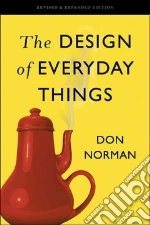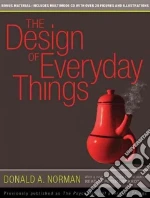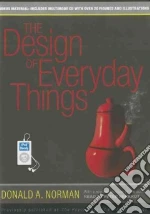 Libri di Norman Donald A. su Unilibro.it) Libri di Norman Donald A. su Unilibro.it)
|
|
2019 |
 Title :
La caffettiera del masochista. Il design degli oggetti quotidiani
Title :
La caffettiera del masochista. Il design degli oggetti quotidianiAuthor: Norman Donald A. Publisher: Giunti Psicologia.IO La caffettiera del masochista svela inganni e paradossi della cattiva tecnologia e mostra che cosa va ad innescare la nostra perversa interazione con gli oggetti di uso quotidiano. Con esempi aggiornati tratti dalla vita di tutti i giorni, Donald Norman spiega che usare ascensori, cucine, computer, interruttori, scale, lavandini non è un semplice gesto manuale: nella nostra esperienza di utenti convergono aspetti tecnologici, processi cognitivi, comportamenti relazionali, connotazioni estetiche, sensazioni emotive. Il design a misura d'uomo combina psicologia e tecnologia per realizzare prodotti nuovi, ma soprattutto facili da usare, comprensibili e, perché no, anche capaci di dare piacere. Perché fare e pensare prodotti e servizi "umani" vuol dire cambiare la nostra idea del mondo. € 22,00
Scontato: € 20,90
|
|
|
1918 |
 Title :
User Centered System Design
Title :
User Centered System DesignAuthor: Norman Donald A. (EDT) Publisher: CRC Pr I Llc € 207,20
|
|
|
1916 |
 Title :
Living With Complexity
Title :
Living With ComplexityAuthor: Norman Donald A. Publisher: Mit Pr € 22,30
|
|
|
2015 |
 Title :
La caffettiera del masochista. Il design degli oggetti quotidiani
Title :
La caffettiera del masochista. Il design degli oggetti quotidianiAuthor: Norman Donald A. Publisher: Giunti Editore A chi non à mai capitato di spingere una porta invece di tirarla o di rinunciare a lavarsi le mani perché non riesce ad azionare il rubinetto? In questi casi la sensazione di incapacità personale è molto forte: eppure, sostiene Norman, la colpa non è dell'utente, bensì di chi ha progettato questi oggetti d'uso comune senza considerare le normali attività mentali la cui conoscenza è essenziale per la progettazione di un ambiente ben organizzato e rispondente alle esigenze della mente. L'autore nel corso del libro passa in rassegna un gran numero di oggetti, accompagnando l'analisi del design con aneddoti e analizzando atti mancati, errori piccoli e grandi, incidenti, dimostrando che il responsabile è il design che induce ad errore. € 9,90
|
|
|
1913 |
 Title :
The Design of Everyday Things
Title :
The Design of Everyday ThingsAuthor: Norman Donald A. Publisher: Basic Books Even the smartest among us can feel inept as we fail to figure out which light switch or oven burner to turn on, or whether to push, pull, or slide a door. The fault, argues this ingenious?even liberating?book, lies not in ourselves, but in product design that ignores the needs of users and the principles of cognitive psychology. The problems range from ambiguous and hidden controls to arbitrary relationships between controls and functions, coupled with a lack of feedback or other assistance and unreasonable demands on memorization. The Design of Everyday Things shows that good, usable design is possible. The rules are simple: make things visible, exploit natural relationships that couple function and control, and make intelligent use of constraints. The goal: guide the user effortlessly to the right action on the right control at the right time. In this entertaining and insightful analysis, cognitive scientist Donald A. Norman hails excellence of design as the most important key to regaining the competitive edge in influencing consumer behavior. Now fully expanded and updated, with a new introduction by the author, The Design of Everyday Things is a powerful primer on how?and why?some products satisfy customers while others only frustrate them. € 17,00
|
|
|
1911 |
 Title :
The Design of Everyday Things
Title :
The Design of Everyday ThingsAuthor: Norman Donald A., Berkrot Peter (NRT) Publisher: Tantor Media Inc First, businesses discovered quality as a key competitive edge; next came science. Now, Donald A. Norman, former Director of the Institute for Cognitive Science at the University of California, reveals how smart design is the new frontier. The Design of Everyday Things is a powerful primer on how-and why-some products satisfy customers while others only frustrate them. € 31,90
|
 Title :
The Design of Everyday Things
Title :
The Design of Everyday ThingsAuthor: Norman Donald A., Berkrot Peter (NRT) Publisher: Tantor Media Inc First, businesses discovered quality as a key competitive edge; next came science. Now, Donald A. Norman, former Director of the Institute for Cognitive Science at the University of California, reveals how smart design is the new frontier. The Design of Everyday Things is a powerful primer on how-and why-some products satisfy customers while others only frustrate them. € 26,80
|
|
2011 |
 Title :
Vivere con la complessità
Title :
Vivere con la complessitàAuthor: Norman Donald A. Publisher: Pearson La complessità è nel mondo e si riflette anche nelle nostre tecnologie. Ma i prodotti che ne derivano non devono essere fonte di confusione, perché allora si tratta di "complicazione" inutile, non di complessità. Tuttavia, anche il sistema meglio progettato richiede uno sforzo - nostro - di apprendimento, per dominare la struttura e i modelli concettuali. La comprensione rende i sistemi complessi semplici e dotati di significato. Donald Norman torna a farci riflettere sulle sfide della tecnologia e del design a partire da casi comprensibilissimi (quando non addirittura divertenti), ma illuminanti e rivelatori. € 20,00
|
|
|
1910 |
 Title :
Living With Complexity
Title :
Living With ComplexityAuthor: Norman Donald A. Publisher: Mit Pr If only today's technology were simpler! It's the universal lament, but it's wrong. We don't want simplicity. Simple tools are not up to the task. The world is complex; our tools need to match that complexity. Simplicity turns out to be more complex than we thought. In this provocative and informative book, Don Norman writes that the complexity of our technology must mirror the complexity and richness of our lives. It's not complexity that's the problem, it's bad design. Bad design complicates things unnecessarily and confuses us. Good design can tame complexity.Norman gives us a crash course in the virtues of complexity. But even such simple things as salt and pepper shakers, doors, and light switches become complicated when we have to deal with many of them, each somewhat different. Managing complexity, says Norman, is a partnership. Designers have to produce things that tame complexity. But we too have to do our part: we have to take the time to learn the structure and practice the skills. This is how we mastered reading and writing, driving a car, and playing sports, and this is how we can master our complex tools. Complexity is good. Simplicity is misleading. The good life is complex, rich, and rewarding--but only if it is understandable, sensible, and meaningful. € 28,70
|
|
|
2009 |
 Title :
The Design of Future Things
Title :
The Design of Future ThingsAuthor: Norman Donald A. Publisher: Basic Books In The Design of Future Things, best-selling author Donald A. Norman presents a revealing examination of smart technology, from smooth-talking GPS units to cantankerous refrigerators. Exploring the links between design and human psychology, he offers a consumer-oriented theory of natural human-machine interaction that can be put into practice by the engineers and industrial designers of tomorrow's thinking machines. A fascinating look at the perils and promise of the intelligent objects of the future, The Design of Future Things is a must-read for anyone interested in the dawn of a new era in technology. € 18,10
|
|
|
2008 |
 Title :
Il design del futuro
Title :
Il design del futuroAuthor: Norman Donald A. Publisher: Apogeo Education Se pensate che il computer, il videoregistratore e il DVD siano inutilmente complicati, immaginate quali meraviglie vi attendono con le nuove automobili a comando vocale! In questa nuova opera il fondatore del design a misura d'uomo fa l'ormai tradizionale panoramica sulle prossime follie che invaderanno il mercato: cucine che decidono come cucinare, frigoriferi che decidono cosa dobbiamo mangiare, navigatori che decidono dove dobbiamo andare. Ci aspetta un incredibile nuovo mondo in cui pensare sembra diventare, di colpo, un'inutile fatica. O no? A questa follia progettuale Norman contrappone una dieta a base di buon senso e scetticismo. Dato che non è più possibile fare a meno delle macchine, si può almeno conviverci da uomini? Sì, se impariamo a comunicare con loro. Ancora una volta Norman mostra come l'unica via percorribile sia quella di una tecnologia con un'anima, a misura d'uomo. € 15,00
|
|
|
2005 |
 Title :
Emotional Design
Title :
Emotional DesignAuthor: Norman Donald A. Publisher: Basic Books Did you ever wonder why cheap wine tastes better in fancy glasses? Why sales of Macintosh computers soared when Apple introduced the colorful iMac? New research on emotion and cognition has shown that attractive things really do work better, as Donald Norman amply demonstrates in this fascinating book, which has garnered acclaim everywhere from Scientific American to The New Yorker.Emotional Design articulates the profound influence of the feelings that objects evoke, from our willingness to spend thousands of dollars on Gucci bags and Rolex watches, to the impact of emotion on the everyday objects of tomorrow.Norman draws on a wealth of examples and the latest scientific insights to present a bold exploration of the objects in our everyday world. Emotional Design will appeal not only to designers and manufacturers but also to managers, psychologists, and general readers who love to think about their stuff. € 16,10
|
 Title :
Il computer invisibile
Title :
Il computer invisibileAuthor: Norman Donald A. Publisher: Apogeo Education La tecnologia migliore è quella che non si vede, perché è tanto semplice da usare da diventare "trasparente". Il computer, invece, è ancora intrusivo, frustrante, fin troppo visibile ed esigente: si tratta ancora di un oggetto progettato da tecnologi per tecnologi. Le cose non devono per forza andare così, dice Donald Norman: ma bisogna ripartire da zero, iniziare con gli apparecchi più semplici (gli "infodomestici", elettrodomestici di informazione), centrati sugli esseri umani, dove la tecnologia informatica scompare dietro le quinte per lasciare spazio ad apparecchi adatti a compiti specifici e in grado di conservare tutta la potenza necessaria senza eccessi di complessità. In questo libro Norman spiega come si possa raggiungere un simile risultato: è necessario ripensare alle modalità di sviluppo dei prodotti, alle idee di base, ai criteri di progettazione, che devono adeguarsi ai tre assiomi di base del design - semplicità, versatilità, piacevolezza. € 18,00
|
|
2004 |
 Title :
Introduction to the Study of Insects
Title :
Introduction to the Study of InsectsAuthor: Borror Donald Joyce, Triplehorn Charles A., Johnson Norman F. Publisher: Brooks/Cole Pub Co First published in the 1950s by the late James Borror and Dwight Moore DeLong, this classic text, INTRODUCTION TO THE STUDY OF INSECTS 7TH EDITION, combines the study of insects with clear and current insect identification. In this new edition (available in a bundle with InfoTrac College Edition), Johnson and Triplehorn supply updated information on phylogeny using systematics while adding a greater emphasis on insect biology and evolution. This greater concentration on insect systematics necessitated many content changes including an added chapter for a newly described order, the Mantophasmatodea, as well as a new chapter reclassifying Order Homoptera (Cicadas, Hoppers, Aphids and Hoppers Psyllids) into Order Hemiptera. Nearly every order has been modified, sometimes substantially, to reflect new discoveries and scientific hypotheses. Many new families have been added throughout the book, some reflecting revised classifications, but many are the result of the discovery of new groups within the United States and Canada, particularly from the New World tropics. These include the families Platystictidae (Odonata), Mackenziellidae (Collembola), Mantoididae (Mantodea), and Fauriellidae (Thysanoptera). The results of molecular analyses are beginning to substantively contribute to the development of a robust and predictive classification. Thus, the phylogeny of insects has changed drastically from the last edition due to the incorporation of molecular data. The most conspicuous of these changes, for example, is the recognition that the order Strepsiptera is most closely related to the true flies (Diptera), rather than to the Coleoptera. Since it was first published in the 1950s, this text has played an important role in understanding and preserving the diversity of the insect world. This title's long history, coupled with the authors' passion for currency and accuracy, make it once again the classic text and reference. € 244,40
|
 Title :
Emotional design
Title :
Emotional designAuthor: Norman Donald A. Publisher: Apogeo Education "Emozione" è oggi una delle parole chiave per il mondo del design (e parliamo di design in generale, non dei siti web): anche la settimana del design a Milano, nello scorso aprile, era dedicata alle emozioni. In questo libro Norman riconosce che le sue concezioni precedenti, tutte impostate sulla funzionalità e sull'usabilità, erano limitate e limitative: non si può non tenere conto del piacere che ci procurano o meno gli oggetti che usiamo quotidianamente. Quello che ciascuno di noi è, è determinato anche dagli oggetti che usiamo: li scegliamo, li apprezziamo non solo per la funzione che svolgono per noi, ma anche per le sensazioni che ci danno. L'analisi di Norman è piena di esempi illuminanti, ma anche ricchi di humour: la serietà scientifica non ostacola la leggibilità e la piacevolezza del testo. € 18,00
Scontato: € 17,10
|
|
1998 |
 Title :
The Invisible Computer
Title :
The Invisible ComputerAuthor: Norman Donald A. Publisher: Mit Pr Technologies have a life cycle, says Donald Norman, and companies and their products must change as they pass from youth to maturity. Alas, the computer industry thinks it is still in its rebellious teenage years, exulting in technical complexity. Customers want change. They are ready for products that offer convenience, ease of use, and pleasure. The technology should be invisible, hidden from sight.In this book, Norman shows why the computer is so difficult to use and why this complexity is fundamental to its nature. The only answer, says Norman, is to start over again, to develop information appliances that fit people's needs and lives. To do this companies must change the way they develop products. They need to start with an understanding of people: user needs first, technology last--the opposite of how things are done now. Companies need a human-centered development process, even if it means reorganizing the entire company. This book shows how. € 11,60
|
|
|
1996 |
 Title :
Why the North Won the Civil War
Title :
Why the North Won the Civil WarAuthor: Commager Henry Steele (EDT), Current Richard Nelson, Williams T. Harry, Graebner Norman A., Donald David Herbert Publisher: Simon & Schuster Focusing on the political, military, economic, social, and diplomatic reasons behind the Union victory, this collection presents the most complete picture of this key aspect of Civil War studies. In an essay new to this edition, Henry Steele Commager offers a historiographical overview of the collapse of the Confederacy. Richard N. Current describes the economic superiority of the North and shows how the civilian resources of the South were dissipated during the war. T. Harry Williams examines the deficiencies of the Southern military strategy and leadership. Norman A. Graebner discusses the reluctance of France and England to aid the South. David Herbert Donald, in his own essay, reports that excessive Southern emphasis on individual freedom fatally undermined military discipline. And David M. Potter suggests that a lack of political leadership in the South resulted in gross incompetence. And exclusively for this edition, the editor has written a new foreword and completely updated the bibliography to create the most comprehensive and enlightening guide to understanding this fascinating issue. € 15,20
|
|
|
1994 |
 Title :
Things That Make Us Smart
Title :
Things That Make Us SmartAuthor: Norman Donald A., Dunaeff Tamara Publisher: Basic Books In Things That Make Us Smart, Donald A. Norman explores the complex interaction between human thought and the technology it creates, arguing for the development of machines that fit our minds, rather than minds that must conform to the machine.Humans have always worked with objects to extend our cognitive powers, from counting on our fingers to designing massive supercomputers. But advanced technology does more than merely assist with thought and memory—the machines we create begin to shape how we think and, at times, even what we value. Norman, in exploring this complex relationship between humans and machines, gives us the first steps towards demanding a person-centered redesign of the machines that surround our lives. € 17,90
|
|
|
1993 |
 Title :
Turn Signals Are the Facial Expressions of Automobiles
Title :
Turn Signals Are the Facial Expressions of AutomobilesAuthor: Norman Donald A. Publisher: Perseus Books Group € 14,60
|